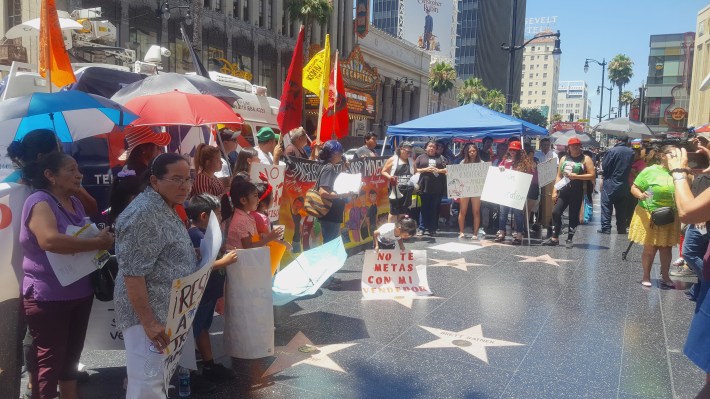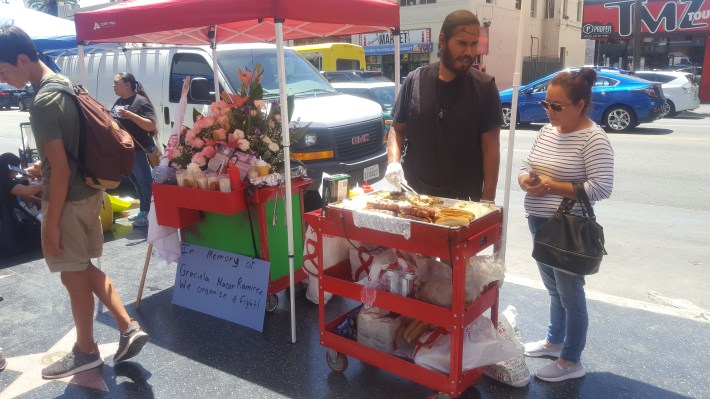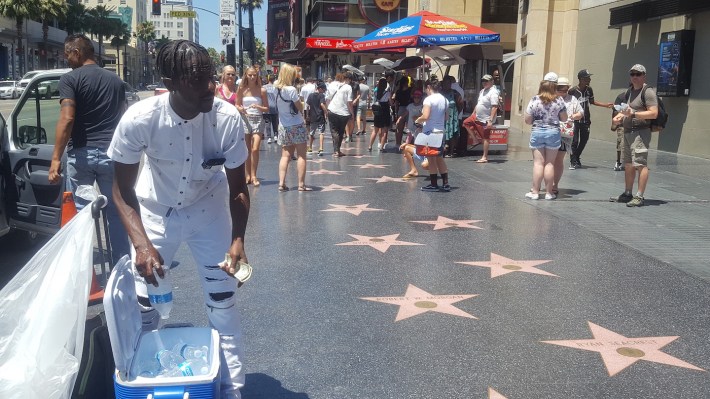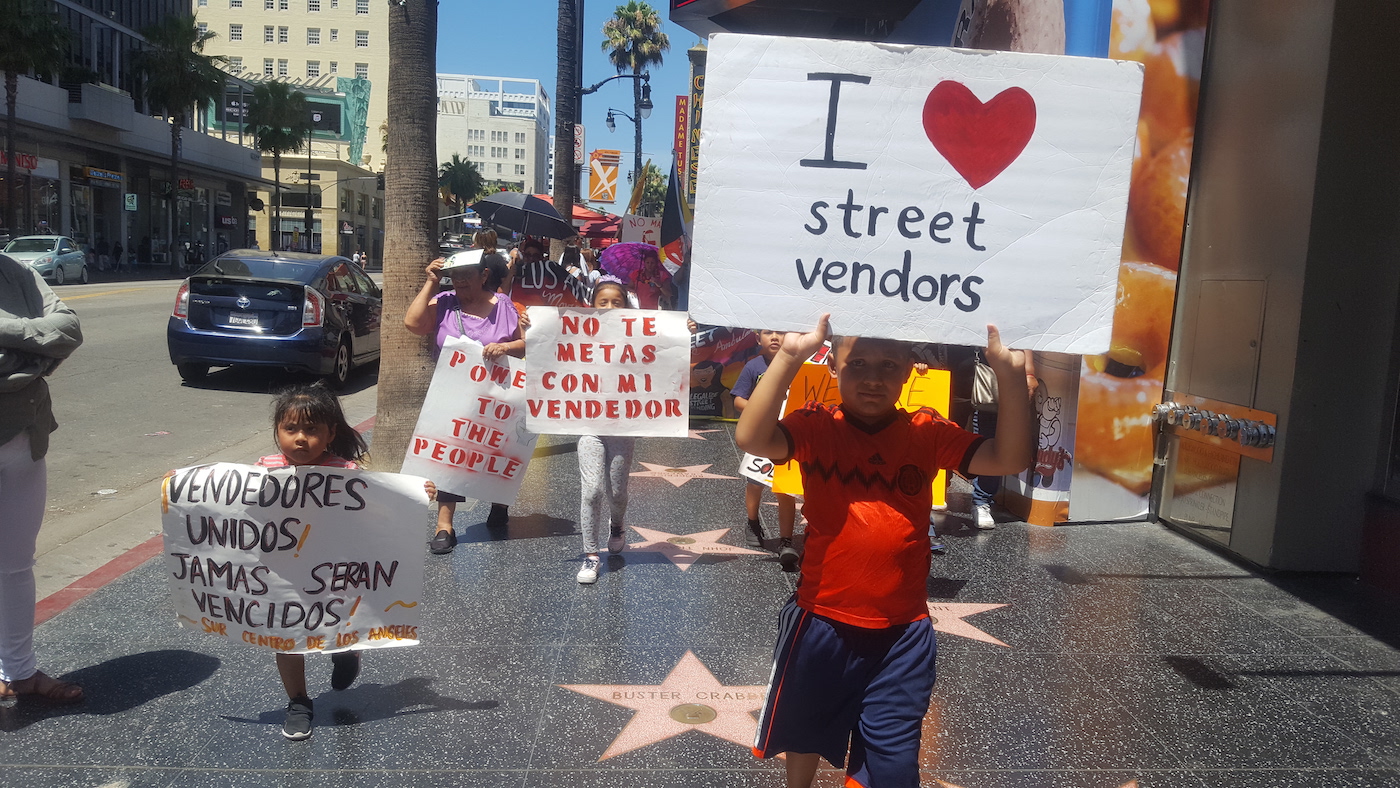[dropcap size=big]O[/dropcap]vernight, the street sign arrived — a new “Special Enforcement Zone” against “bulky items” — right among the selfie-snapping tourists and costumed movie characters that congregate around Hollywood and Highland. The bureaucracy-ese translates to: ‘Stop setting up to sell bacon-wrapped hot dogs here.’
On Monday, vendors and their supporters in Hollywood rallied against the threat of a new enforcement campaign meant to clear them from the busy tourist magnet of the Hollywood Walk of Fame. The protest served as a renewed call for urgency at City Hall over the slow-moving efforts to legalize street vending on L.A. sidewalks.
Hollywood is one of the toughest places to implement legalization: local business leaders want the Walk of Fame area to be exempt from allowing street vendors at all. “Aqui estamos y no nos vamos!” the vendors chanted Monday, under a scorching midday sun. (“We’re here, and not going anywhere!”)

Demonstrators gathered near one of the new street signs on a light pole on Hollywood Boulevard. The signs are part of a “Hollywood Pilot Project” aimed at more aggressively enforcing ordinance 56.11, which prohibits bulky items on public thoroughfares. Originally, the law was aimed at people leaving large pieces of furniture outdoors, and against certain kinds of homeless encampments.
“The sign came up, that’s how we found out,” said Rudy Espinoza, executive director of LURN, one of the groups advocating for the vendors.
On July 3, City Councilmember Mitch O’Farrell, who represents the Hollywood area, introduced a motion to the City Clerk to move funds to the Hollywood Pilot Project on bulky item enforcement. The fear is that the program will lead to increased harassment from city enforcers against people who set up hot dog carts on sidewalks in Hollywood, usually at night for people leaving clubs or music venues.
“It’s just discrimination,” said Rosa Miranda, one of the organizers behind the rally.
RELATED: L.A. Taco on KCRW: Listen to a Discussion on Street Vendors with Chery Glaser
[dropcap size=big]O[/dropcap]fficials say the practice of selling bacon-wrapped hot dogs from heated carts is unsanitary and unsafe, because the carts crowd sidewalks that are already jammed with tourists and performers dressed up as action heroes or film villains. They also say the vending threatens the city’s ability to comply with the American Disabilities Act, because vendors allegedly crowd access to sidewalks for people in wheelchairs.
“No one will be criminalized nor arrested, however there are guidelines in place to confiscate the bulky items on Hollywood Boulevard between Orange Avenue and McCadden Place,” said Tony Arranaga, communications director for O'Farrell, in a statement to L.A. Taco. “Pedestrian safety is the Councilmember’s top priority in office, as well as protecting the cultural historic landmark of the Hollywood Walk of Fame.”

In response, vendors say they just want a seat at the table. Organizers allege city leaders “blindsided” vendors on the Special Enforcement Zone. A tentative meeting with vendors is now scheduled for this week. The hot dog sellers already have several ideas they’d like to propose to the city to keep sidewalks accessible, such as organizing themselves into “shifts,” Espinoza said.
“Some of them have been here for decades, they’re part of the community, too,” the organizer said. “With everything happening in this country, with Jonathan Gold passing away this weekend, this is a time to see how we can support our neighborhood entrepreneurs.”
“Vendors are Los Angeles. They’re part of the city,” he added.
Gold, the Pulitzer Prize-winning LA Weekly and L.A. Times food critic, championed vendors in every way, Espinoza argued. Gold supported the efforts to legalize street vendors, while the writer served on the board of the L.A. Food Policy Council, he added.
“I remember him stunned, stunned, when he realized it was illegal, that vendors that he was writing about were criminalized,” Espinoza said Monday. “I think he saw that these entrepreneurs are assets in our neighborhoods.”

Up the way, a vendor named Mike Jones stood cheerily selling bottled water for $1. “The sun is going to work a number on you!” Jones called to potential customers. “I’m good! I’m melanated!” Several tourists stopped, seemingly grateful Jones was there.
The young man did not participate in the protest, but he said he saw the need to figure out rules that worked for everyone. He’s been stopped and arrested for selling on the street, he told L.A. Taco, a tactic he called pointless.
“There are … other ways to make money,” Jones said. “This is honest.”
For vendor Dennis Reyes, the latest push against his work by the city put into perspective the loss of his mother, also a vendor. Graciela Nacar Ramirez sold hot dogs on Hollywood Boulevard during a time that LAPD would “literally chase” vendors through the street. On one of those occasions four years ago, she tripped, injured herself, and developed an infection that would affect her health until her death — just one week ago, Reyes said.
“We’d have to run, because they would chase us,” said the vendor, 24. He spoke while cooking hot dogs from the cart his mother left him.
RELATED: Street Vendors: ‘We’ll Believe Legalization Drive When We See it in Practice’







